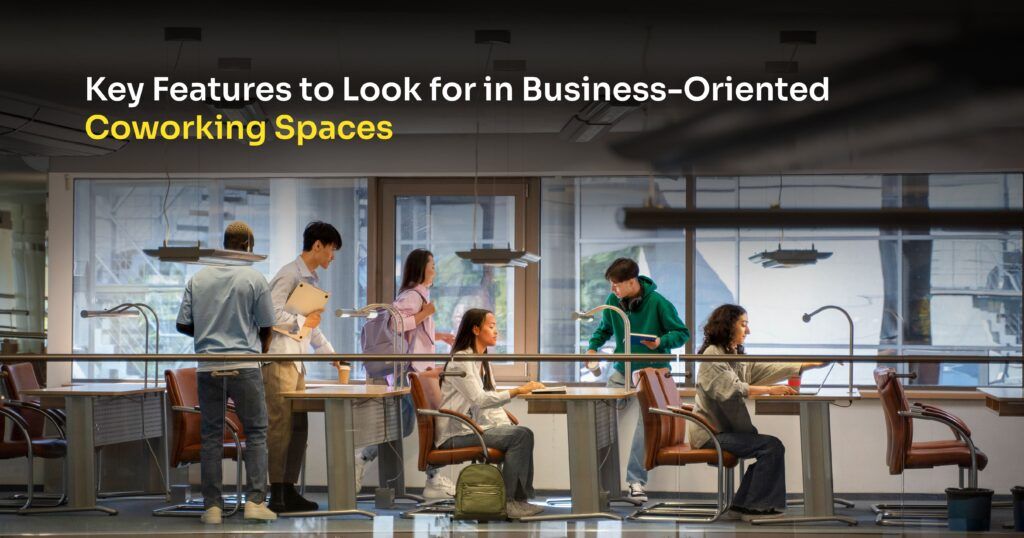In the fast-paced business world, finding an efficient, distraction-free workspace is essential for professionals who need to balance productivity with flexibility. In Chennai, coworking spaces have evolved into key hubs for businesses seeking dynamic and cost-effective work environments. As of December 2024, the city boasts 241 coworking spaces, marking a 6.58% increase from the previous year. This growth reflects the rising demand for flexible workspaces among professionals and entrepreneurs.
Offering much more than just a desk, coworking spaces in Chennai provide high-speed internet, meeting rooms, networking opportunities, and flexible membership plans. The India coworking office space market is projected to reach USD 2.08 billion in 2025, growing at a compound annual growth rate (CAGR) of 7%, and is expected to reach USD 2.91 billion by 2030. This trend underscores the increasing adoption of coworking spaces across the country.GII Research+1Mordor Intelligence+1
As business demands change, these spaces are becoming integral for professionals across industries. This comprehensive guide explores the top coworking spaces in Chennai for business professionals in 2025, helping you find the ideal setting to enhance productivity, collaboration, and growth.
The Evolution of Coworking Spaces in Chennai
Chennai’s coworking landscape has evolved significantly since its inception in the early 2010s. Initially a niche concept, coworking spaces have now become a staple in the city’s business ecosystem, offering an innovative solution for businesses of all sizes.
Growth Trajectory Through 2025
Chennai’s coworking market has seen impressive growth, with over 1.4 lakh seats spread across 4.7 million square feet of coworking space, and a healthy 28% vacancy rate, which signals continued growth potential. Additionally, the city’s office space market is set to exceed 100 million square feet by 2026, up from the current 89 million square feet.
Private equity investment in coworking spaces remains robust, with INR 100.41 billion poured into the sector during 2022-2024. In Q1 2024 alone, office space transactions reached 1.2 million square feet, marking a 45% year-on-year growth. Leading brands such as Smartworks, WorkEZ, WeWork, Cactus, and Awfis are helping to shape this evolution, with even government entities supporting coworking development in various parts of the city.
Impact of Chennai’s IT Boom on Coworking Demand
The city’s growing IT sector has been a major driver behind the demand for flexible office spaces. As Chennai solidified its position as a key tech hub, the need for professional, adaptable workspaces grew substantially. However, the market now extends beyond IT, with increased participation from sectors such as banking, financial services, insurance (BFSI), life sciences, and more.
Chennai has also seen growth in Global Capability Centers (GCCs), now ranked third in India after Bengaluru and Hyderabad, contributing further to the demand for coworking spaces. Moreover, Chennai is India’s second-largest data center market, creating even more demand for flexible office solutions.
Why Business Professionals Should Consider Coworking Spaces in 2025 ?

In 2025, the benefits of coworking spaces for business professionals are more evident than ever. These spaces provide the perfect balance of flexibility, cost-effectiveness, and professional infrastructure for growing businesses.
Enhanced Productivity and Focus
Coworking spaces foster environments designed for high productivity. Unlike home offices or noisy cafes, these spaces are tailored to support focus and collaboration. The design of these spaces often encourages efficiency, providing professionals with high-speed internet, ergonomic workstations, and 24/7 accessibility in a distraction-free environment.
Professional Development and Networking Opportunities
One of the standout features of coworking spaces is the opportunity to network with like-minded professionals. These environments expose business professionals to diverse industries, facilitating connections that could lead to collaborations, partnerships, and new business opportunities.
Many coworking spaces also host workshops, industry expert sessions, and mentorship programs. These events not only help professionals stay updated on industry trends but also allow them to gain valuable insights from experienced leaders in their field.
Cost-Effectiveness and Flexibility
Coworking spaces offer businesses a cost-effective alternative to traditional office spaces. With flexible membership plans, from day passes to long-term leases, companies can choose solutions that fit their needs. Businesses can scale quickly without committing to long-term contracts or dealing with the overhead of maintaining office spaces.
Moreover, coworking spaces come with a range of included services that can be costly for individual businesses to secure. These include high-quality meeting rooms, professional-grade printing services, and access to state-of-the-art office infrastructure—all at a fraction of the cost of leasing a private office.
Tailored for Various Business Needs
As the coworking landscape in Chennai matures, spaces are becoming more specialized, catering to industries like technology, finance, healthcare, and more. Whether you’re a startup looking for an affordable yet professional space or an established business seeking a collaborative environment, there is a coworking solution in Chennai that fits your needs.
Key Coworking Space Providers in Chennai
- The Executive Zone
- WeWork
- WorkEZ
- Awfis
- Cactus
These providers are at the forefront of the coworking revolution in Chennai, offering a wide range of services and amenities designed to support the modern business professional. Many of these spaces also offer additional services like virtual offices, private cabins, and custom workspace solutions to meet specific needs.
The Future of Coworking Spaces in Chennai
Looking ahead to 2025, the demand for coworking spaces in Chennai will continue to grow, fueled by the city’s thriving business ecosystem. With increasing industry diversification and a growing number of professionals seeking flexible, high-quality office environments, coworking spaces will play a pivotal role in shaping the future of business in the city.
Coworking spaces will remain an essential tool for businesses that prioritize flexibility, cost-efficiency, and networking opportunities. As more companies embrace the benefits of coworking, the spaces themselves will evolve to offer even more tailored solutions for professionals across industries.
Top Coworking Spaces for Business Professionals in Chennai

Chennai offers a wide array of coworking spaces that cater to the diverse needs of business professionals in 2025. These spaces provide not only the essentials like high-speed internet and meeting rooms, but also professional environments that foster collaboration, innovation, and business growth.
Business-Oriented Amenities
The best coworking spaces in Chennai are equipped with amenities designed to support the demands of professionals. The Executive Zone, for instance, offers 24/7 access, ideal for businesses with flexible schedules or those needing to accommodate clients from different time zones. Their fully-equipped coworking spaces ,virtual office, private office, meeting rooms, event space, hot desk etc.. are perfect for team collaborations, client meetings, and presentations. AtWorks Space in Alwarpet goes a step further, offering high-speed Wi-Fi and complimentary refreshments, along with a rooftop garden that serves as a tranquil space for brainstorming and creative thinking.
For businesses focused on employee wellbeing, some coworking spaces also provide wellness facilities, such as meditation rooms, yoga classes, and gyms. Workafella offers an on-site fitness center, ensuring that professionals can maintain a healthy work-life balance amidst their demanding schedules.
Location Advantages Near Key Business Hubs
Proximity to business hubs makes coworking spaces in areas like Anna Salai, Mount Road particularly valuable. The Next Office in Anna Salai, Mount Road, for example, is located near several corporate offices and business parks, making it a convenient location for meetings and networking. Similarly, coworking spaces in Adyar and Nungambakkam are ideal for businesses seeking connections with academic and research communities, while T. Nagar locations provide vibrant, easily accessible environments perfect for professionals seeking convenience and connectivity.
Community and Networking Benefits
A major advantage of coworking spaces is the opportunity to network and collaborate. The Grid stands out as a community-driven space that encourages networking and collaboration among its members. It’s a great place for professionals looking to forge new business partnerships or explore mentorship opportunities. Two Trees Coworking Space fosters a friendly, open environment that encourages spontaneous networking, which can be particularly beneficial for business professionals looking to expand their professional connections.
Throughout 2025, most coworking spaces in Chennai will continue to host regular events, workshops, and networking sessions, connecting professionals with industry leaders, potential partners, and mentors.
Key Features to Look for in Business-Oriented Coworking Spaces

When choosing the right coworking space in Chennai, business professionals should prioritize features that support productivity, collaboration, and growth.
High-Speed Internet and Tech Infrastructure
Reliable, high-speed internet is crucial for business success. Efficient connectivity enables seamless communication with clients, quick document sharing, and uninterrupted video conferences. Ensure the coworking space offers:
- Business-grade internet with fiber connectivity
- Access to printers, scanners, and other office technology
- Backup power systems to prevent disruptions
- Modern workstations with ergonomic furniture
Flexible Membership Plans
Top coworking spaces in Chennai offer flexible membership plans that suit businesses of all sizes. Look for spaces that offer pricing structures based on your company’s specific needs:
- Day passes or hourly rates for occasional use
- Monthly memberships with flexible contract terms
- Premium packages that include access to private offices, meeting rooms, and extended hours
Collaborative Spaces and Meeting Rooms
For businesses requiring team collaboration, coworking spaces provide designated meeting rooms and collaborative areas. These spaces are equipped with necessary presentation tools, whiteboards, and projectors—ideal for pitches, team discussions, and client meetings.
Technology Integration in Chennai’s Coworking Spaces

The integration of advanced technology in coworking spaces has become a key factor for businesses. Coworking spaces in Chennai now feature smart systems, digital solutions, and seamless tech infrastructure that support efficient work processes.
Smart Workspace Solutions
Many coworking spaces in Chennai are adopting integrated technology systems such as MiQube™, which allows users to control various workspace functions through a single platform. This includes booking meeting rooms, controlling lighting, and managing HVAC systems, creating a streamlined experience.
Some spaces also incorporate AI-powered entry systems that enhance security and provide a smooth visitor experience. These smart technologies create a professional atmosphere that’s ideal for business professionals.
Digital Access and Booking Systems
Modern coworking spaces in Chennai now offer cloud-based access systems that allow members to easily book meeting rooms, check workspace availability, and manage access rights based on membership tiers. These systems offer:
- Real-time updates on available spaces
- Automated access control for after-hours work
- Streamlined booking of meeting rooms and other facilities
Virtual Collaboration Tools
Many coworking spaces in Chennai are equipped with tools to support virtual collaboration. Video conferencing platforms like Zoom and Google Meet are available, enabling seamless remote communication with clients, partners, and teams. Additionally, project management platforms such as Trello, Asana, and Basecamp help track tasks, assign responsibilities, and ensure smooth collaboration.
Pricing Models and Accessibility for Professionals
Affordability and accessibility remain key factors for business professionals considering coworking spaces. Many providers offer tiered membership models and special pricing for businesses with fluctuating needs.
Pay-Per-Use Options
For businesses with irregular schedules or small teams, pay-per-use models offer flexibility without long-term commitments. Platforms like GoFloaters allow businesses to rent space on a daily or hourly basis, providing greater flexibility for project-based work. Day passes typically start around ₹200, making it an affordable option for short-term requirements.
Tailored Membership Plans
Many coworking spaces in Chennai offer customized plans to meet the needs of businesses:
- Dedicated desks for ₹7,500 to ₹10,000 per month
- Flexible desk options starting at ₹3,500 to ₹6,500 per month
- Budget-friendly packages from ₹799 per month
These tiered options ensure that businesses can choose plans that best align with their operational requirements and financial capacity.
Networking and Professional Growth Opportunities
Beyond providing physical infrastructure, coworking spaces in Chennai function as networking hubs that help business professionals advance their careers.
Industry Connections
Chennai’s coworking spaces are home to professionals from a variety of sectors, including tech, finance, and healthcare. This offers invaluable networking opportunities for business professionals. Locations such as OMR (IT corridor) and Sholinganallur are ideal for tech startups and IT professionals, while spaces in Nungambakkam attract professionals from the corporate world.
Skill Development Workshops
Many coworking spaces in Chennai host workshops and training sessions designed to help professionals enhance their skill set. These workshops cover:
- Digital marketing, content strategy, and SEO
- Financial literacy, accounting, and investment strategies
- Technology skills, including coding and data analytics
- Soft skills such as communication and leadership
These events provide business professionals with hands-on learning experiences that can help them stay competitive in the rapidly changing business environment.
Mentorship Programs
Several coworking spaces in Chennai offer structured mentorship programs where experienced professionals guide and support newcomers to the industry. These programs help professionals gain insights into the latest industry trends and business strategies, contributing to career advancement and growth.
How to Choose the Right Coworking Space for Your Business
Choosing the right coworking space involves evaluating several key factors that align with your business needs.
Location Considerations
Proximity to clients, partners, and business hubs is crucial. Choose coworking spaces that are centrally located and easily accessible by public transportation. Locations near major business districts or your target market will reduce commute time and enhance networking opportunities.
Budget Planning
Consider your business’s financial situation when selecting a coworking space. Look for flexible membership options that suit your budget, and be sure to check for additional costs like meeting room bookings or parking fees. Many coworking spaces offer tailored plans for businesses of different sizes, helping you find an affordable solution.
Community Culture Assessment
A strong community can provide valuable support for business growth. Visit potential spaces to assess whether the community aligns with your business’s values and goals. Look for spaces that foster collaboration and host events where you can connect with other professionals, share ideas, and potentially form partnerships.
Future Trends in Chennai’s Coworking Industry
Chennai’s coworking landscape is rapidly evolving, with 2025 ushering in exciting developments tailored to the needs of business professionals. The coworking industry is no longer just about desks and high-speed internet; it’s becoming a dynamic ecosystem that blends modern work practices with flexibility, collaboration, and cutting-edge technology.
Hybrid Work Models and Tech-Enabled Spaces
By 2025, hybrid work models are expected to become the norm for coworking spaces in Chennai, offering a seamless blend of virtual and physical environments. These adaptable spaces will cater to businesses that require flexibility, enabling teams to work remotely when needed while also providing a professional setting for in-person collaboration and meetings.
The shift in work culture post-pandemic has permanently changed how coworking spaces operate, with a growing emphasis on tech-enabled infrastructure. Many spaces will integrate solutions that facilitate virtual meetings, online collaboration, and remote work alongside physical office spaces. This setup not only supports business continuity but also allows professionals to maintain work-life balance by providing flexible schedules aligned with peak productivity times.
Specialized Business Zones
The future of coworking in Chennai will see a growing trend toward specialized zones within coworking spaces tailored to different industries. These dedicated areas will provide resources aligned with the specific needs of various sectors, such as technology, finance, design, and healthcare.
For businesses in sectors like IT or biotech, spaces will offer dedicated zones equipped with industry-specific tools and resources, ensuring that professionals can work in an environment designed to meet their specialized requirements. Additionally, collaborative zones will be available for teams working on joint projects or brainstorming sessions.
Partnerships Between Corporates and Coworking Spaces
A key development in Chennai’s coworking industry is the growing collaboration between corporate companies and coworking providers. Major business center hubs in the city are establishing partnerships with coworking spaces to offer flexible workspaces for teams, freelancers, and entrepreneurs.
Companies looking to expand their workforce without committing to long-term office leases can take advantage of the flexibility provided by coworking spaces. This partnership model supports businesses looking to scale efficiently and connect with a dynamic pool of talent from diverse sectors. Expect coworking providers to continue forging alliances with corporates, enabling them to access top-tier workspaces, networking events, and industry-specific collaboration.
University and Industry Collaborations
Another major trend is the increasing partnership between universities and coworking providers. Universities like Anna University are building research parks that blend coworking spaces with student incubation facilities, helping students and professionals bridge the gap between academic knowledge and industry application. These collaborations foster innovation, encouraging the development of student startups and fostering a culture of entrepreneurship within educational institutions.
As more universities partner with coworking providers, professionals will have greater access to networking opportunities, workshops, and mentorship programs. These partnerships create avenues for knowledge exchange and offer students and professionals alike the chance to work alongside thought leaders, innovators, and industry experts.
Advanced Technology Integration
The future of coworking spaces in Chennai will be heavily influenced by advanced technology integration. These spaces will feature smart systems, AI-powered tools, and automation to streamline processes and improve the user experience. For instance, businesses will be able to control lighting, temperature, and workspace booking systems through integrated platforms.
AI will play a key role in enhancing productivity by offering features like smart meeting rooms equipped with multimedia tools, real-time occupancy tracking, and automated access systems. These innovations will provide a more efficient, secure, and professional environment for business professionals, helping them stay competitive in today’s fast-paced business world.
Conclusion
Chennai’s coworking industry is evolving into a dynamic ecosystem that offers far more than just desk space. As hybrid work models, specialized zones, and corporate-university partnerships gain prominence, coworking spaces are becoming hubs of innovation, networking, and growth. These spaces provide business professionals with the flexibility to adapt to changing work environments, access industry-specific resources, and collaborate with like-minded professionals.
For businesses looking to thrive in 2025, coworking spaces in Chennai offer the ideal environment for both individual professionals and teams. With advancements in technology, flexible work models, and a growing focus on collaboration, Chennai’s coworking ecosystem will continue to evolve, shaping the future of work for the next generation of professionals.
![Coworking Space in Chennai -A Guide for Business Professionals [2025]](https://ik.imagekit.io/coworking/img/coworking-space-in-chennai-guide-scaled.jpg)



